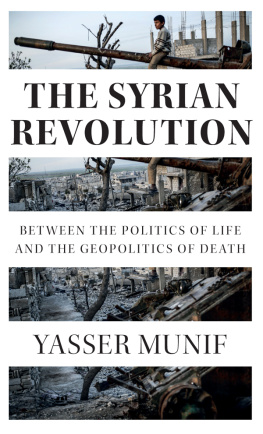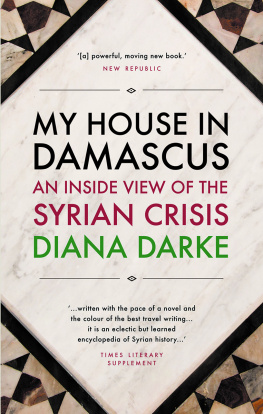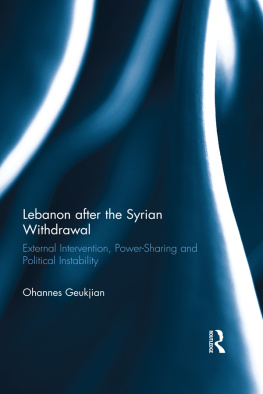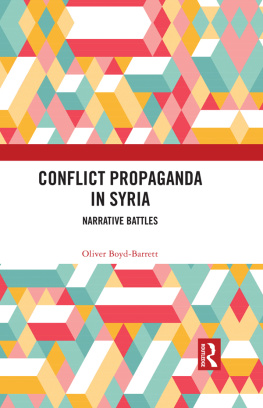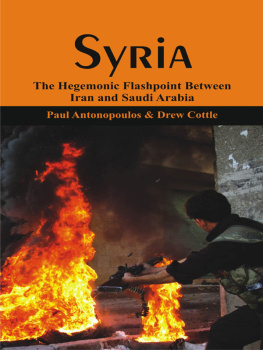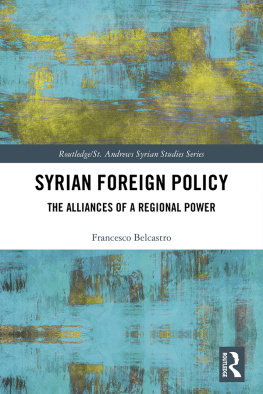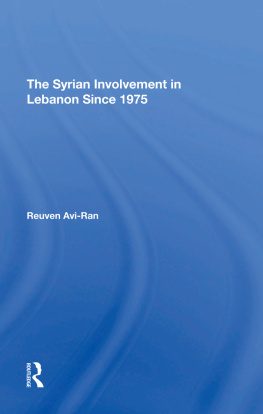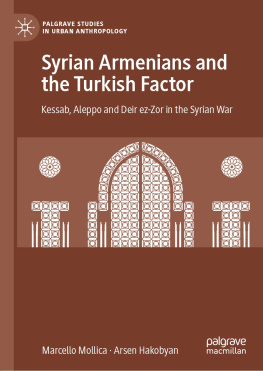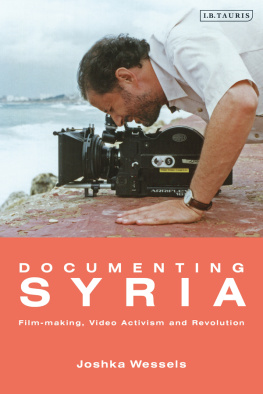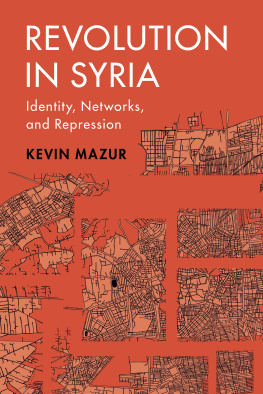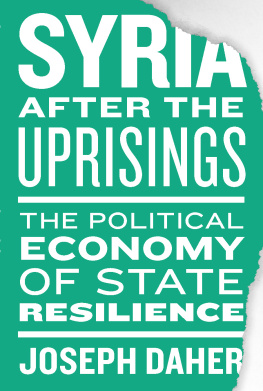Contents
Guide
The Syrian Revolution
The Syrian Revolution
Between the Politics of Life
and the Geopolitics of Death
Yasser Munif

First published 2020 by Pluto Press
345 Archway Road, London N6 5AA
www.plutobooks.com
Copyright Yasser Munif 2020
The right of Yasser Munif to be identified as the author of this work has been asserted by him in accordance with the Copyright, Designs and Patents Act 1988.
British Library Cataloguing in Publication Data
A catalogue record for this book is available from the British Library
ISBN 978 0 7453 4071 5 Hardback
ISBN 978 0 7453 4072 2 Paperback
ISBN 978 1 7868 0580 5 PDF eBook
ISBN 978 1 7868 0582 9 Kindle eBook
ISBN 978 1 7868 0581 2 EPUB eBook
Please note, some maps are drawn from Wikipedia and amended by a Syrian cartographer who wishes to remain anonymous for political reasons.
Every effort has been made to trace copyright holders and to obtain their permission for the use of copyright material in this book. The publisher apologises for any errors or omissions in this respect and would be grateful if notified of any corrections that should be incorporated in future reprints or editions.
This book is printed on paper suitable for recycling and made from fully managed and sustained forest sources. Logging, pulping and manufacturing processes are expected to conform to the environmental standards of the country of origin.
Typeset by Stanford DTP Services, Northampton, England
Simultaneously printed in the United Kingdom and United States of America
To Syrians who rose up against tyranny and injustice.
Contents
Acknowledgments
Writing this book was a collective endeavor and I wouldnt have been able to achieve it without the help of many friends and colleagues. They are too numerous to mention here but I am deeply grateful to each one of them for their invaluable and brilliant suggestions to previous drafts of chapters included in this book.
An earlier version of the fifth chapter, Participatory Democracy and Micropolitics in Manbij: An Unthinkable Revolution was previously published in the book Arab Politics beyond the Uprisings: Experiments in an Era of Resurgent Authoritarianism, ed. Thanassis Cambanis and Michael Wahid Hanna (New York: The Century Foundation Press, 2017). I would like to thank the editors for granting the permission to print it here. I am also grateful to the Arab Council for the Social Sciences for funding part of the research for this project.
This book would not have been possible without the generous help of friends in Manbij, Raqqa, Aleppo, Damascus and elsewhere in Syria who challenged my ideas about Syria and taught me to unthink everything I knew about my country to begin to understand revolutionaries praxes and ideas. My deep gratitude and appreciation goes to them.
I began working on this project almost five years ago and it went through many iterations. I am deeply grateful to my extraordinary wife, Elsa Wiehe, who shared every step of this journey. Her constant support, critical questions, and encouragements have made writing this book possible. I would also like to thank my wonderful daughters, Yara and Zoya, for their patience and despite their multiple acts of sabotage. I hope that the day they open this book to read it, dictatorship will have become something of the past.
Introduction
In March 2015, the World Social Forum (WSF) was held for the second consecutive time in Tunis. The Tunisian capital was chosen by the organizers to emphasize the importance of the Arab revolts and their impact on social movements globally. Evidently, there were many panels and events about the Arab and Syrian uprisings. During the Forum, Assad supporters attacked several dozens of people attending a panel about the Syrian revolt that I helped organize. As I finished introducing one of the speakers, the late Syrian-Palestinian intellectual Salameh Kaileh, about 20 men entered into the conference room causing a scuffle. They chanted pro-Assad slogans, and removed pro-revolution posters and a banner from the walls. When attendees tried to steer them out of the room, they became threatening and shouted, You are terrorists! No to regime change in Syria!
Two years prior, a similar incident had taken place at the same Forum. Assad supporters became quickly agitated when they realized that half a dozen of us were collecting signatures for a petition that condemned the Syrian regimes atrocities. Heated arguments about the Syrian revolt and confrontations such as the ones described here are not unusual; in fact, they have become the norm since 2011. In the United States and Europe, it is common to see pro-Assad supporters or pro-revolution activists picket or disrupt the events of their political rivals.
Another fervent debate took place in the field of chemistry and ballistic science to determine who was behind the various chemical and non-chemical attacks in Syria. Theodore Postol, professor of science, technology, and international security at the Massachusetts Institute of Technology is one of the leading experts in the field.
In the same vein, the archeological community is split around the role of the Assad regime in the destruction and looting of archeological sites such as Aleppos Old City, Palmyra, or Krak des Chevaliers castle. It is logical that the Russian president put the blame on ISIS for the destruction of Syrias historical sites but that UNESCO is helping him to polish his image is problematic to say the least.
Maamoun Abdulkarim, the Director-General of Antiquities and Museums in Syria, argued that the greatest threat to Syrias archeology is ISIS. He told Ian Black, the Guardians journalist, that the Syrian government has been protecting archeological objects during the war. He then concluded, [n]ow we hide things in Damascus, but if Damascus falls, what can we do? We are not supermen. However, the thrust of the article is about ISISs systematic destruction of archeological sites and the government strategies to prevent that. Black writes,
[i]n scenes that echoed the second world war story of the Monuments Men who saved artworks from destruction or looting, 24,000 objects were also brought by truck from Aleppo earlier this year. The heroine of that operation was a 25-year-old Syrian archaeologist who stayed with the army-escorted convoy for a hazardous 11-hour journey.
The irony is that The Guardian published an article, less than a year later, titled Syrian Troops Looting Ancient City Palmyra, says Archaeologist. This explains why many believe that the Syrian regime is a legitimate partner when it comes to defeating ISIS and preserving world historical sites. Maamoun Abdulkarim understands these dynamics and knows how to exploit Western sensibilities as his conversation with Black demonstrates.
The tragic reality is that the debates occurring within the field of archeology are not exceptional or surprising. Scholars in fields as diverse as health, environmental science, ballistic science, not to mention the social sciences, history, or the humanities are all deeply split around the same issues. Many scholars decided to become guardians of a hegemonic geopolitical order instead of mobilizing resources within their fields to support Syrians struggle for justice and self-determination. Conversely, these professional circles should use the Syrian revolt to decolonize their disciplines, and make sure theyre not simply vehicles of state power or international law deployed against oppressed groups in Syria. These seemingly impartial academic or technocratic debates cannot be delinked from the lives of Syrians and their daily experiences. As seen above, some of these debates have lethal consequences, while certain academics and professionals are complicit in the regimes crime.

